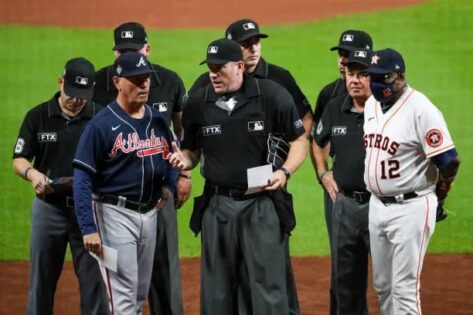Baseball has always been more than just bats and balls — it’s a theater of emotion, pressure, and legacy. But every so often, the spotlight shifts from the players to the ones behind the plate. One of the most unforgettable moments in baseball history came during the 2010 season, when umpire Jim Joyce made a blown call at first base that cost Tigers pitcher Armando Galarraga a perfect game — with just one out to go. The video replay was clear, but there was no reversal, only heartbreak. That moment reignited a debate that still burns today: how much power — and room for error — should umpires have?
Fast forward to April 6, 2025, and the conversation was once again front and center — this time in Denver. The Colorado Rockies, despite being on the wrong end of a controversial umpiring performance, managed to flip the script with an explosive offensive display. In a game filled with drama, it was the questionable calls that once again reminded everyone just how much influence an umpire’s judgment can hold — for better or worse.
At Coors Field, the Colorado Rockies faced the Oakland Athletics in the final game of their series. Colorado’s offense came alive, securing a 12-5 victory with 14 hits—a significant breakout after a sluggish start to the season. Oakland managed 8 hits but couldn’t match the Rockies’ momentum. The game, attended by 26,207 fans and completed in a brisk 2 hours and 33 minutes, was filled with excitement beyond the scoreboard.
But focus soon shifted to the performance of home plate umpire CB Bucknor. Bucknor, being the target of reports circulating on the internet, including claims highlighted by accounts like Umpire Auditor. It said: “Umpire CB Bucknor blew 15 calls including 4 strikeouts in the Rockies Athletics game. Of the 15 bad calls, 11 went against the Rockies. Bucknor leads the league in blown strikeouts”. This instantly gave the impression of a very skewed performance behind the plate.
Umpire CB Bucknor blew 15 calls including 4 strikeouts in the Rockies Athletics game. Of the 15 bad calls, 11 went against the Rockies.
Bucknor leads the league in blown strikeouts. pic.twitter.com/TOiVM8yx6l
— Umpire Auditor (@UmpireAuditor) April 7, 2025
Reviewing the potential impact, the A’s appeared to gain from the bulk of the alleged miscues. Since 11 of the 15 errors were obviously called in favor of Colorado, Oakland hitters might have enjoyed extended at-bats or faced Rockies pitchers were facing artificially inflated pitch counts. But Oakland managed only five runs, and analysis shows that these calls might have added them a run or two to keep the game closer than it should have been, especially considering their pitching staff’s struggles.
It was not the only umpiring controversy sparking discussion early in the 2025 season.
Calls for ABS grow louder after Rockies game
Only a few days prior, during a Cardinals vs. Angels game on April 3rd, umpire Mike Muchlinski was said to have blown 22 calls. One report said, 16 of those errors allegedly favored St. Louis. And it drew sharp criticism from the Angels’ manager and fans alike. These early-season examples illustrate a not-so-new problem that repeatedly vexes teams. This, in turn, generates calls for increased accuracy and accountability.
In retrospect, baseball history is sadly filled with moments where the act of umpiring stole the spotlight, including during the biggest moments. Who can forget the infamous call made by the first base umpire Don Denkinger in the 1985 World Series? The one that many felt cost the St. Louis Cardinals the victory? This is a sobering reminder of how a single decision can resonate deeply.
And CB Bucknor has a long history of questionable calls beyond this latest game. A phantom foul tip call ended a Nationals-Braves game abruptly and incorrectly in 2017. In 2022, he was also in the news for not resetting the pitch clock during a Guardians-Rays game. These past mistakes shape his reputation and intensify the scrutiny when he makes debatable calls in games he officiates.
In light of this constant challenge, many are asking about potential solutions. The top contender is the Automated Ball-Strike (ABS) system, most notably the challenge format that has been trialed in Triple-A and MLB spring training. This system allows teams a handful of challenges in a game on ball/strike calls that are reviewed by Hawk-Eye technology. The average accuracy of human umpires is about 92 to 95%, while ABS pushes towards near-perfect accuracy on reviewed calls. Minor league trials even saw game times decrease by about nine minutes. This suggests an improved pace with fairness to compete.
Now the question remains: As technology evolves, will MLB fully embrace systems like ABS to minimize these controversies? Or will the unpredictable human element be a part of baseball’s DNA forever? For now, the debate continues—but one thing’s clear: every missed call brings us a little closer to letting the machines call balls and strikes.
The post Umpiring Woes Takes Center Stage Again as Rockies Overcome Crisis to Stun Athletics in High-Stakes Clash appeared first on EssentiallySports.
